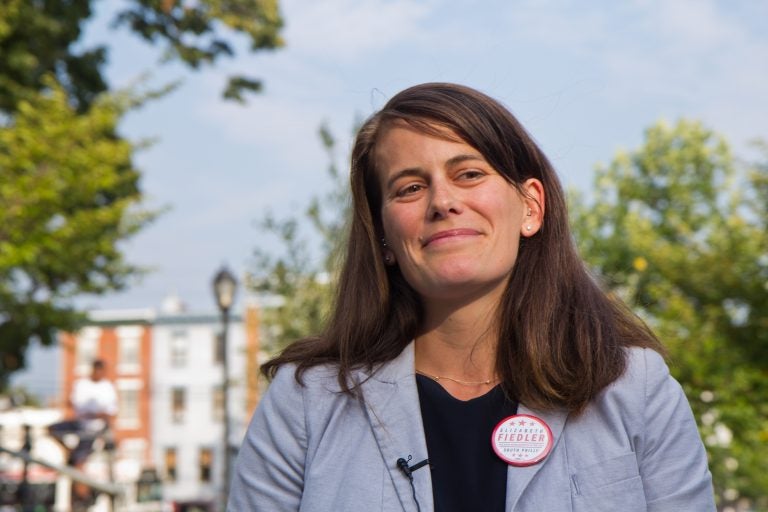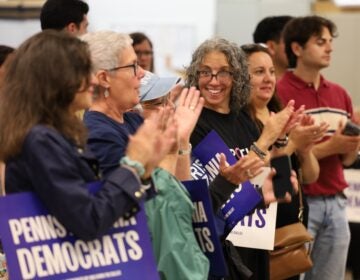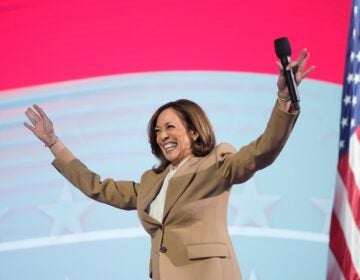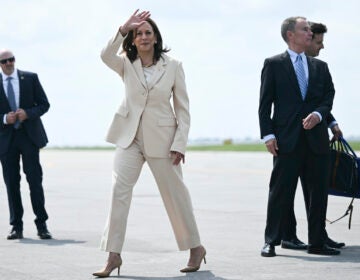A socialist wave in Pennsylvania?
Did the endorsement of the Democratic Socialists of America help three women who won Pennsylvania House races?
Listen 2:03
Former WHYY reporter Elizabeth Fiedler came away with a win in the 184th House District primary race. (Kimberly Paynter/WHYY)
Is Pennsylvania in the vanguard of a socialist surge in the Democratic Party?
You might think so if you read the New York Times.

Michelle Goldberg’s Sunday column, occasioned by the stunning victory of 28-year-old Alexandria Ocasio-Cortez in a Bronx congressional primary, also prominently featured three Pennsylvania women who won state House primaries in May – Philadelphian Elizabeth Fiedler, and two western Pennsylvanians, Summer Lee and Sara Innamorato.
All four were supported by the Democratic Socialists of America, of which Ocasio-Cortez is a member.
The DSA wasn’t the driving force behind the Pennsylvania candidates, and Fiedler doesn’t describe herself as a Democratic Socialist. But the DSA provided welcome assistance to all three candidates.
What does it mean?
It’s interesting to consider the impact of the socialist current as a national debate rages in the Democratic Party over its approach and message in this year’s critical congressional elections.
On the one hand, it seems the socialist agenda of national health care, free college tuition, and the rejection of corporate funding for political candidates has appeal to younger voters.
Data released recently by Philadelphia City Commissioner Al Schmidt shows that voters age 18 to 34 turned out at a rate 29 percent higher than for the primary four years ago, while all other categories of voters had lower turnout.
Ward breakdowns of turnout show huge increases in millennial turnout in the wards in Fiedler’s district, though there were other factors at work, including a competitive congressional race.
Further, there’s plenty of room for growth among progressive millennial voters. Citywide turnout among 18- to 34-year-olds was just 8 percent, a figure no doubt affected by the fact that Pennsylvania has closed party primaries, preventing anyone registered as independent from voting for party candidates.
Turnout in Fiedler’s district among 18- to 34-year-olds was higher – 22 percent – but still lower than other age groups.
Wide appeal?
Does the success of candidates accepting socialist support mean the American electorate is ready for that agenda?
Hard to say, but it’s worth noting that Fiedler won her race handily by getting the votes of only 14 percent of the registered Democrats in her district. For Ocasio-Cortez, who also won big, the percentage was closer to 11 percent.
That just means that these candidates won party primaries in which most voters were pretty disengaged, which is generally true these days.
To be sure, turnout in the Fiedler race ran well above the citywide average, but when compared with the broader electorate, the numbers aren’t big.
Some traditional Democrats are wondering what happens to the party’s hopes to take control of Congress if Democrats are seen as the party of socialism.
I spoke to Natalie Midiri, a former co-chair of the Philadelphia chapter of the Democratic Socialists of America and currently a member of the organization’s national political committee.
She pointed out that the organization has seen enormous growth, with about 40,000 members nationally, and that the DSA is connecting with voters in substantive ways.
“DSA isn’t just the socialist label,” she said. “We’re really starting to stand for a program, so that when a candidate receives a DSA endorsement, that candidate is seen as someone who won’t take corporate PAC money, as someone who will fight tooth and nail for Medicare for all.”
Fiedler said she was happy to have the support of the DSA — along with unions, community groups, and others who supported her message.
“I don’t really apply many labels to myself,” Fiedler said, “but I’m the daughter of two union public school teachers, and I’m really proud to work on behalf of working people of South Philly on everything — economy, job creation, health care, everything.”
Apart from the appeal of progressive ideas and the help of socialists, Fiedler and the other three women won through sheer effort — attracting committed volunteers and knocking on thousands of doors, canvassing and re-canvassing and engaging voters of all ages.
Have it both ways
T.J. Rooney, a former state chair of the Pennsylvania Democratic Party, told me the success of left-leaning candidates will be good for everyone this fall.
Candidates in solid blue districts — including the three Pennsylvania women endorsed by the DSA — will have no trouble winning with their progressive agenda.
In more centrist districts, Rooney said, moderate Democrats will distinguish themselves from the socialist agenda, and thus prove to voters they’re a safe choice.
“You can’t win in places like Bethlehem, Pennsylvania, with a socialist message,” Rooney told me. “But you can win in places like Bethlehem with a Democratic message, and I think the two can co-exist within the same larger tent.”
It’s a fascinating question. Can the party capture the energy of younger, socialist-leaning Democrats with candidates who reject their core ideology?
Will progressive Democrats, who want the party to reject corporate funding and embrace far-reaching policy initiatives for health care and economic equality, still come out and vote for candidates who reach for the center in the general election?
I have no idea, but the stakes for the party are high.
When I ask Fiedler about this, she says she thinks the party needs more candidates who will put the needs of people above the interests of the wealthy.
As for her immediate plans, “I just want to get to work.”
With no Republican opponent, she will be sworn in as a freshman state representative in January.
—
Disclosure: Elizabeth Fiedler is a former WHYY reporter and producer.
WHYY is your source for fact-based, in-depth journalism and information. As a nonprofit organization, we rely on financial support from readers like you. Please give today.





